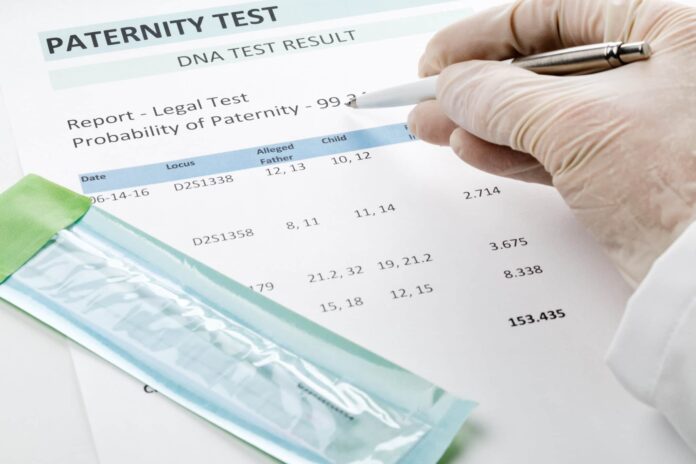The DNA test is an essential procedure in the United Kingdom, which is paternity testing (or testing the father). This test shows if a man is the biological father of a child. For example, in the UK, there are particular guidelines on how these tests should be performed to maintain fairness, decency, and discretion.
Paternity test information is significant for any individual facing lawful inconsistencies, just as for those looking to become familiar with their family associations. Paternity tests in the UK are conducted according to strict legal rules and ethical standards to determine biological fatherhood. Suppose you’re doing all this for lawful purposes, out of curiosity, or for medical reasons. In that case, this article contains all the necessary information on how to proceed without seeking help from anyone else.
Why Paternity Testing Matters?

A paternity DNA test is essential in different areas, such as legal matters, personal relations, and medical issues.
1. Legal Matters
The main reason why fathers want a paternity test in the UK is to tackle legal questions. It could involve setting up parental rights to have parental responsibility questions decided in child custody matters, choosing financial obligations in applications for children’s financial support, and probate litigation where there are questions around an estate distribution.
2. Peace of Mind
For personal reasons, someone might use paternity testing to ensure they’re the father of a child or to confirm that they are not. “Confidence” testing is generally optional and non-binding.
3. Medical Considerations
Medical reasons can also warrant paternity testing. It enables the evaluation of the potential risks from hereditary conditions passed down through either parent; this allows for timely diagnosis and intervention.
Types Of Paternity Testing
In the UK, two main types of paternity testing are commonly used:
1. Court-Ordered Testing
Court-ordered testing is required to resolve legal proceedings such as child custody, child support or immigration cases. Testing results obtained from a court order are testimonials and may be used during legal proceedings.
2. Peace Of Mind Testing
This is a consensual test done by people who want to recognize the fatherhood of their child for their own sake. Peace of mind test results are not statutory but may give people precisely what they want.
The Legal Framework

The legal framework in the UK plays an essential role in ensuring fairness:
1. Human Tissue Act 2004
In the UK, there is specific legislation regarding how and when one can use human tissue for purposes such as paternity tests. There is legislation called the **Human Tissue Act 2004** that sets out the guidelines for how DNA samples of individuals should be collected, looked after, and used to achieve this aim.
2. Consent
Consent is a core principle in the Human Tissue Act. All the concerned need to sign their informed and voluntary consent before carrying out a paternity test. It is also essential for both the child (if capable of understanding) and the purported father.
3. Children And Consent
When the minor child is under 16 years old, their legal custodian and the parent with authority must represent and agree on the child’s behalf. It’s interesting; however, it’s worth mentioning that if the kid’s old enough to comprehend what the test means, he can also give his approval.
4. Accredited Laboratories
On the other hand, another critical parameter in the legislation is that Paternity Testing should be performed at a lab with certification. The results from these labs are held to strict standards for the accuracy, reliability and fairness of their reporting.
The Paternity Testing Process
The paternity test in the UK follows specific steps, which makes it very effective and reliable in proving who the biological parent is.
Step 1: Contact a Testing Provider
First, you must identify a trusted company to perform a paternity test. You need to select a provider accredited by the appropriate authorities to ensure the dependability of the outcome.
Step 2: Arrange an Appointment
After selecting a testing provider, you must schedule an appointment to undergo the testing process. Usually, this can be done quickly online or by phone.
Step 3: Collect DNA Samples
DNA samples are typically collected using a buccal swab. It is a non-invasive test where a swab of the inside of the cheek takes cells. The child, so-called father and any other persons involved in the examination must provide their samples.
Step 4: Send Samples to the Laboratory
Once the samples are collected, they must be appropriately packaged and delivered to an accredited laboratory for testing. Samples must be handled carefully during transit to ensure integrity, so following the provider’s instructions is essential.
Step 5: Receive the Results
After the samples are collected, the laboratory will analyze them. The waiting time for receiving the results can vary from some days to weeks. The test provider will send you the results.
Step 6: Understand the Results
When the results come back, it is essential to know what they mean. If the paternity test is positive, then it means that the suspected parent is the baby’s legal father. When paternity is at issue, the biological relationship of the alleged father to a child does not exist.
Broader Ramifications Of Paternity Testing

Paternity testing is functional, but it is essential to consider the bigger picture and how the results might affect everything.
1. Emotional Impact
Paternity test results can have a powerful emotional effect on all parties concerned. Taking the method with understanding and compassion is essential, especially concerning paternity in personal relationships.
2. Legal Obligations
Where paternity is established via court-ordered DNA testing, the alleged father may have legal responsibilities, such as child support, which must be dealt with.
3. Family Dynamics
Paternity testing can have long-lasting implications for family relations. It will transform relationships, roles and responsibilities within the family system.
Conclusion
Maternity and paternity tests in the UK are regulated by specific rules and practices intended to ensure fairness and accuracy and uphold ethical standards. Regardless of whether you are seeking a trial for legal needs or your well-being, you need to pick a dependable testing supplier, comprehend the cycle, and think about other implied outcomes. Paternity testing processes involve informed consent, accredited laboratories and strict compliance with legal regulations. By managing Paternity testing correctly and with sensitivity, individuals can get answers without infringing on privacy or feelings.




